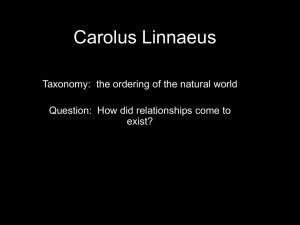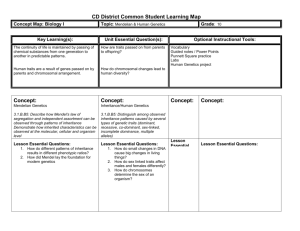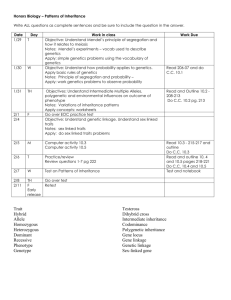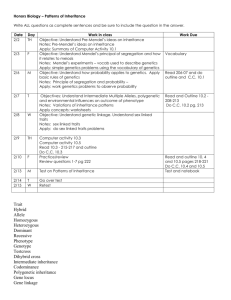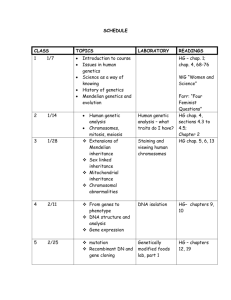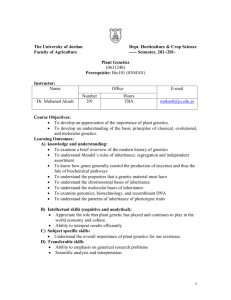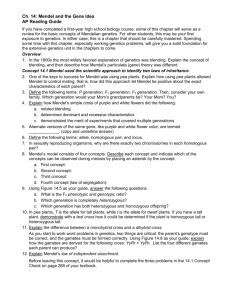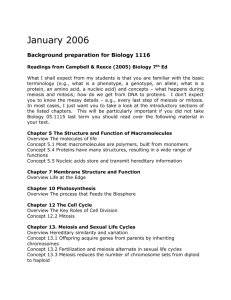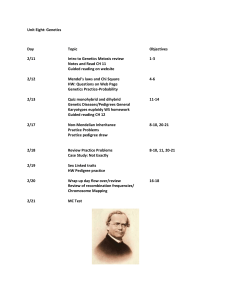BASIC GENETICS - Makerere University Courses
advertisement
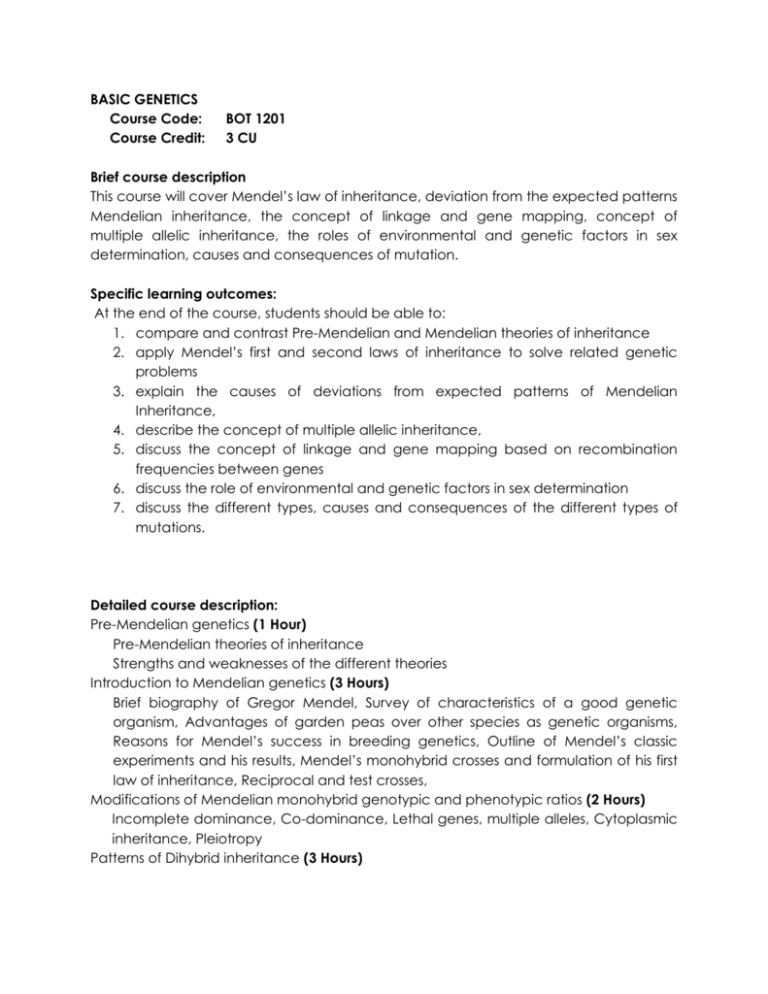
BASIC GENETICS Course Code: Course Credit: BOT 1201 3 CU Brief course description This course will cover Mendel’s law of inheritance, deviation from the expected patterns Mendelian inheritance, the concept of linkage and gene mapping, concept of multiple allelic inheritance, the roles of environmental and genetic factors in sex determination, causes and consequences of mutation. Specific learning outcomes: At the end of the course, students should be able to: 1. compare and contrast Pre-Mendelian and Mendelian theories of inheritance 2. apply Mendel’s first and second laws of inheritance to solve related genetic problems 3. explain the causes of deviations from expected patterns of Mendelian Inheritance, 4. describe the concept of multiple allelic inheritance, 5. discuss the concept of linkage and gene mapping based on recombination frequencies between genes 6. discuss the role of environmental and genetic factors in sex determination 7. discuss the different types, causes and consequences of the different types of mutations. Detailed course description: Pre-Mendelian genetics (1 Hour) Pre-Mendelian theories of inheritance Strengths and weaknesses of the different theories Introduction to Mendelian genetics (3 Hours) Brief biography of Gregor Mendel, Survey of characteristics of a good genetic organism, Advantages of garden peas over other species as genetic organisms, Reasons for Mendel’s success in breeding genetics, Outline of Mendel’s classic experiments and his results, Mendel’s monohybrid crosses and formulation of his first law of inheritance, Reciprocal and test crosses, Modifications of Mendelian monohybrid genotypic and phenotypic ratios (2 Hours) Incomplete dominance, Co-dominance, Lethal genes, multiple alleles, Cytoplasmic inheritance, Pleiotropy Patterns of Dihybrid inheritance (3 Hours) Definition of dihybrid inheritance, Description of Mendel’s dihybrid crosses, Introduction to probability concepts as they relate to predicting outcomes of dihybrid crosses, The Punnett square method, The concept of independent assortment. Mendel’s second law of Inheritance, The dihybrid test cross Modifications of Mendelian dihybrid genotypic and phenotypic ratios (3 Hours) Incomplete dominance, Co-dominance, Lethal genes, Epistasis, Reciprocal gene interaction Multiple Allelic inheritance (3 Hours) Coat color inheritance in rabbits, ABO blood groups in man, Practical applications of blood group typing, Rhesus factor inheritance and its implications, ABO blood group system and disease susceptibility, Inheritance of self incompatibility alleles in plants Gene linkage (2 Hours) Concept of linkage, Types of linkage, Crossing over: detection, advantages and disadvantages Gene mapping (3 Hours) Recombination frequencies / cross over values, Triangulation method of determining gene order, Factors affecting recombination frequencies between genes, Sex determination in plants and animals (3 Hours) Environmental sex determination, disadvantages of environmental sex determination, Genetic sex determination, abnormalities of sex determination and their symptoms, Chromosomal non-disjunction Inheritance related to sex (3 Hours) Sex influenced characteristics, Sex limited characteristics, holandric characteristics, Sex linked characteristics, Pedigree analysis, Mutations (4 Hours) Definition and classification of mutations, Causes of mutations, Types of mutagens, Gene mutations, Frameshift and non-frameshift mutations, Chromosome mutations, aneuploidy and euploidy Practical (30 Hours) Mode of delivery: The course will consist of lectures, practicals and tutorials Assessment method: This will be done through examinations (60%) and coursework (practicals, tests and assignments) (40%) READING LIST 1. BURNS, G.W. (1980). The Science of Genetics: an introduction to Heredity. Macmillan Publishing Company Inc. New York, 4th edition. 2. FANSWORTH, M.W. (1978). Genetics. Harper international edition. Harper and Row Publishers Inc. 3. GREEN, N.P.O, STOUT, G.W and TAYLOR, D.J. (1998). Biological Science Vol. I & II. Cambridge University Press, United Kingdom. 4. HARTL, D.L and JONES, E.W. (2001). Genetics: analysis of genes and genomes. Jones and Bartlett Publishers, United States, 5th edition. 5. MUSCHEL, L. H. (1966). Blood Groups, Disease, and Selection. Bacteriological Reviews, 30: 427-441. 6. NEWMAN, S.A. (2005). The pre-Mendelian, pre-Darwinian world: Shifting relations between genetic and epigenetic mechanisms in early multi-cellular evolution; Journal of Biosciences 30: 75–85 7. STRICKBERGER, M.W. (1968). Genetics. The Macmillan Company, New York.
